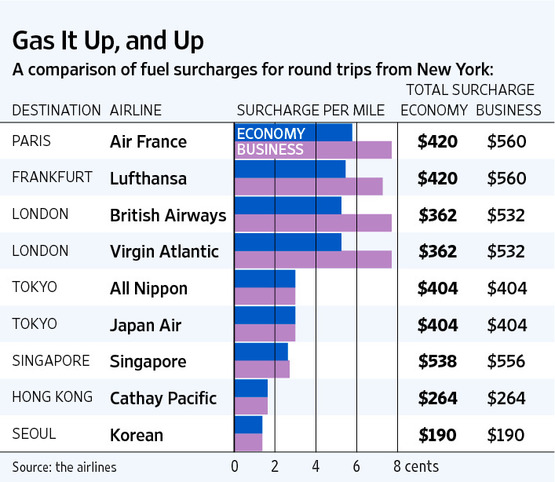From time to time, I have blogged about the increasing cost of award tickets, particularly when using frequent flyer programs outside the United States. Scott McCartney nicely highlights this issue in his weekly column, demonstrating that for many seeking to book an airline ticket using miles, the ticket is not even close to being “free.” In fact, using miles may even be foolish: you might save money just buying a revenue ticket.
Fuel has risen 45% over the last year and airlines are scrambling for ways to pass this increased cost onto consumers. They have done this primarily through fuel surcharges: an additional fee that is added to the base fare and often disguised as taxes. The problem with this is two-fold. First, the fuel surcharge can sometimes be double or even triple the cost of the base fare. The money is all going to the airline’s pocket so it seems odd to me that an airline would segregate the cost of fuel from the cost of a ticket. We don’t see the airline separating labor and food costs as well…
Second, and perhaps this answers my last question, when you book an award ticket on many airlines like British Airways, Lufthansa, and British Midland, your miles will cover the base fare but you will be on the hook for government taxes and the fuel surcharge. Suddenly that “free” ticket is $500+. How convenient for the airline…
On British Airways, a New York-London coach ticket will cost you 50,000 miles plus $566.50 in cash. Of that, $362 goes to the airline and $204.50 goes to airport and government fees and taxes, mostly to the United Kingdom, which taxes air tickets heavily. Bottom line: You can buy the same seat without spending any miles for $811.50, meaning you spent your 50,000 miles to save only the $245 base fare—a lousy value.
By comparison, the same New York-London ticket on a U.S. airline would typically cost at least 50,000 miles (and possibly many more) plus $167 in taxes and fees.
Business-class awards can cost even more, in both cash and miles. A round-trip New York-London business-class award seat on Virgin Atlantic costs 90,000 miles plus $834. Governments and airports get $302 of that; Virgin gets the other $532. You are essentially paying a coach fare in cash (actually, a real coach seat would cost just $811.50) and then using your 90,000 miles for an upgrade.
Illuminating, huh? Buying an economy ticket and upgrading on Virgin Atlantic can be cheaper than an award ticket in business class. And you would earn miles on the trip!
The flip side, of course, is that some U.S. airlines have instituted a tiered award structure (cough, cough…Delta [though American and United/Continental have as well]) in which it is nearly impossible during peak season to redeem a “saver” award. You may not have to pay a fuel surcharge, but you may end up forking double or triple the miles for the trip than you would have during “low” season.
I personally prefer the U.S. method, especially because frequent flyer miles are so much easier to earn in the United States, but I want to return to the subject of the fuel surcharges on awards.
Some are calling for government intervention, arguing that airlines should not be allowed to separate fuel from the price of the ticket. While I think airlines are guilty of some trickery, there is no disputing that fuel costs have risen and airlines are struggling to balance the books. What I would like to see airlines do voluntarily is offer an award redemption structure such that you could redeem miles as normal, paying a smaller amount and coughing up for the fuel surcharge or pay more miles and have the airline take care of the fuel surcharge and government taxes, making an award ticket truly “free” in terms of no cash exchanging hands. Without question, this is easier said than done. U.S. law, for example, requires that airlines collect a 9/11 security fee on every airline ticket, revenue or award. But that woudl be a compromise I would be willing to support.

image: courtesy of Wall Street Journal
You can take steps to minimize your exposure to heavy fuel surcharges by booking award tickets on airlines that do not levy them or only tack on small fuel surcharges. Qantas, for example, only charges a A$40 round-trip fuel surcharge on international tickets. That makes redeeming those BA miles on QF a very attractive option.
Unless oil prices stabilize and begin to retreat, look for continued to increases in the cost of fuel surcharges. Whether you view this as an thuggery by the airline industry or a necessary response to the increase in oil prices, it looks like fuel surcharges are here to stay.




Leave a Reply